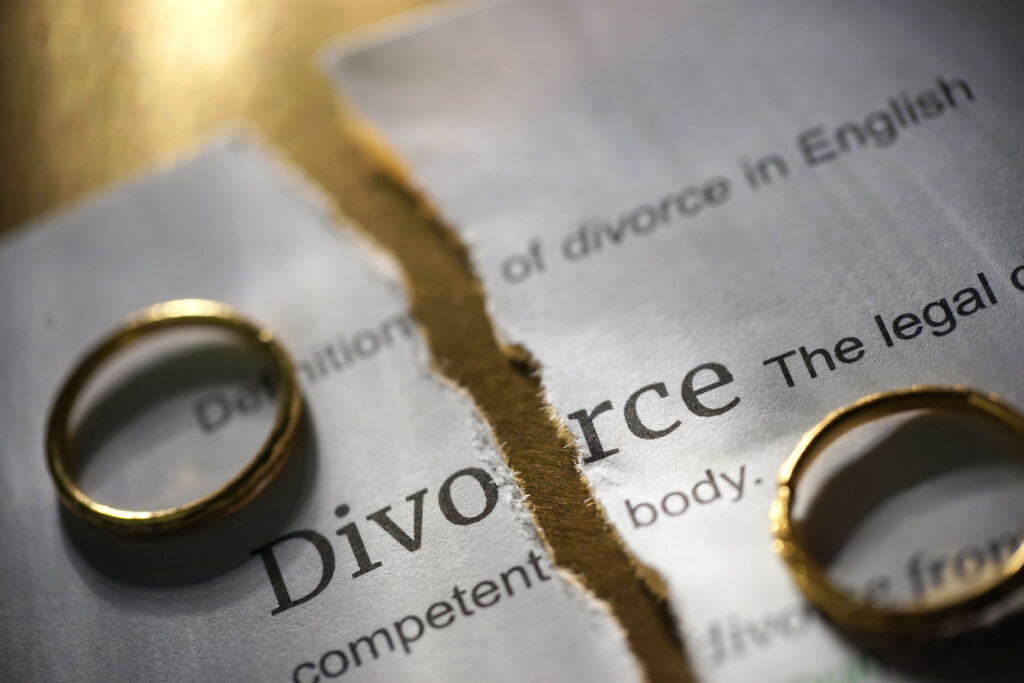Getting a divorce can be a daunting prospect. To help you better understand the process, we have answered some frequently asked questions on divorce below.
When can I apply for divorce?
You can only apply for divorce if you have been married for at least one year. To apply for divorce, your marriage needs to have irretrievably broken down.
At this very moment, the marriage is only recognised by the court to have irretrievably broken down if one of five circumstances apply:
a) Adultery
b) Unreasonable behaviour
c) Desertion
d) Two years of separation with consent
e) Five years of separation (no consent needed)
For points a – b to apply, it needs be proven that it is intolerable for you to continue living with your spouse.
However, as of April 2022, you will be able to apply for divorce, without the need to prove a-e, and instead by simply confirming the marriage has irretrievably broken down. This new law has been tagged as ‘no fault divorce’. Find out more information about no-fault divorce in our recent blog here.
How do I apply for divorce?
You apply for divorce online via a form called a divorce petition. This is sent to the divorce centre local to you for processing.
Once the divorce centre has received your divorce petition, the court will issue the petition. Your spouse will have to complete a document called the acknowledgement of service within seven days of having received the issued petition. It is then open to you to apply for decree nisi, the conditional order of divorce. If the judge, on reading your petition and considering your application for decree nisi, considers that the marriage has irretrievably broken down, they will pronounce ‘decree nisi’. This is a document that states you are entitled to a divorce, but are not yet divorced.
After decree nisi is pronounced, you will then apply for ‘decree absolute’. This is the document that grants the divorce. You may apply for decree absolute six weeks and one day following the pronouncement of decree nisi. Your spouse must wait longer.
How long does it take to get a divorce?
On average, it takes about four to six months to get a divorce. However, due to the current strain on the courts resulting from the pandemic and an increased workload, it can take much longer.
You may also wish to delay finalising the divorce until the marital finances are appropriately divided.
How much does a divorce cost?
The application for a divorce costs £593. Families on low incomes can apply for a fee waiver, which can be found on your local family court’s website.
If you choose to instruct a solicitor, the costs may be more than this. Legal aid is only available for divorce in very limited circumstances.
Do I need a lawyer?
You do not need a lawyer to apply for divorce, however, it may be beneficial to instruct a solicitor to help you.
Marital breakdowns are an emotionally turbulent time, and sometimes it can be easier to have a solicitor dealing with the administrative processes on your behalf, as they are not emotionally involved. The court can occasionally return forms back to you if they are not completed properly, or do not have all the information the court requires. This can cause delays in processing your divorce, and is something a solicitor would handle on your behalf.
Do I need to go to court?
You do not need to go to court if the divorce is not contested. The judge will hold a hearing to declare your decree nisi and decree absolute, but this not a hearing you are required to attend.
For a contested divorce, there may be a requirement to attend court.
Is the divorce public?
All divorces are private, due to the privacy of the family courts. The decree absolute is the only publicly available document and contains the names of the parties, the date and place of the marriage, and the date of the decree itself only.
What if my spouse does not want to get divorced?
If your spouse does not want to get divorced, this does not stop you from applying. In the current system, you can apply for divorce relying on facts a-b, if they are relevant to your circumstances. If your spouse denies a-b applying, then this would be a contested divorce and you would need to prove to the court that the facts you rely on are true. A solicitor can help you to draft your petition in such a way as to ensure that you can evidence the facts upon which you rely, if it becomes necessary. However, if you cannot rely on a-b, then currently, you would have to wait five years until being able to apply for decree absolute.
Five years is a long time to wait, which is one of the reasons why the new legislation is being implemented. As of April 2022, you will no longer need to wait five years, if your spouse does not consent to divorce. You will be able to apply for divorce irrespective of their consent.
What if I do not want to get divorced?
If you do not want to get divorced, you can try marital counselling.
However, if your spouse has applied for divorce, then the divorce process explained above will apply. If your spouse has already applied for divorce, then the existing divorce law will apply and you can choose to contest the divorce.
If your spouse applies after April 2022, your consent will not be required, and you cannot contest the divorce.
What if we are not married but I want to separate?
If you are not married, but want to separate, then the provisions of divorce do not apply. You are free to leave your relationship whenever you wish. Complications may arise if your finances are linked or if you have children. This is something you should take advice on, as finances between non-married couples is a specialist area of law.
If you and your partner entered into a civil partnership, then the process is very similar to the divorce process. Instead of applying for divorce, you would apply to dissolve the civil partnership. There is a similar two-step process, but instead of decree nisi and decree absolute, you apply for a ‘conditional order’ and a ‘final order’. They each have the same effect.
If you don’t want to end the civil partnership right away, you can apply for a legal separation.
What if we were not married in the UK?
The courts of England and Wales have the power to grant a divorce when a marriage has taken place in another country, as long as the marriage was legally valid in the country in which it took place. You have the choice as to whether to apply for divorce in the UK, or in the country in which you were married depending on the laws relating to jurisdiction in that country. A variety of circumstances will influence this decision, including the law in each country and how that would impact any financial settlement.
However, you can only apply for divorce in England and Wales if:
- You or your spouse are habitually resident in England and Wales, and have resided here for more than a year
- Both you and your spouse were last habitually resident in England and Wales, and one of you still resides here
- You or your spouse are domiciled here
- You are habitually resident in England and Wales, have resided for six months and you are domiciled here
I’ve been served with a divorce petition, what do I do?
The next thing you need to do is consider whether or not you wish to instruct a lawyer to represent you in your divorce proceedings.
You will need to confirm that you have received the petition by completing the ‘acknowledgement of service’ form and sending that back to the address on the form. You need to do this within seven days.
We have children, does that impact our divorce?
Children do not impact the divorce itself.
That being said, if on the marital break down, you and your spouse cannot agree arrangements for the children, then you may need to seek legal advice about your next steps. Arrangements for children are separate to the divorce, and if court proceedings are required, they are dealt with under a completely separate case number.
Children will be relevant and influence any financial settlement the court may grant on divorce.
Does the divorce process resolve our finances?
Obtaining a divorce does not resolve your and your spouse’s finances. If you do not resolve financial matters on divorce, then, in certain circumstances, you and your spouse can claim for provision indefinitely, including if one of you dies.
To resolve finances on divorce, you can negotiate the separation of the marital pot, and ask the court to approve any agreement you reach. The court takes various factors into account when deciding whether or not to approve this.
If you are unable to negotiate and come to an agreement, then usually you would apply to the court for financial relief.
Should you choose to instruct a solicitor, then this would be something they will be able to advise you on in detail.
Get in touch
If you are thinking about divorce, or your spouse has applied for divorce, then please get in touch with our Family and Matrimonial team. We would be happy to assist you in navigating this complex area of law during what is surely a difficult time.


